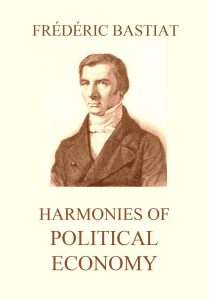Harmonies of Political Economy – Frédéric Bastiat
“Harmonies of Political Economy”, the last and principal work of Frédéric Bastiat, has been translated by Mr. Stirling, who says of it, “This great work, the child of Bastiat’s anxious hopes, the subject of his dying thoughts, …. is perhaps the most important and the most original contribution which the science of Political Economy has received since the days of Adam Smith.” Its design is thus explained in the author’s own words: “I undertake in this work,” he says, “to demonstrate the harmony of those laws of Providence which govern human society. What makes these laws harmonious and not discordant is, that all principles, all motives, all springs of action, all interests, cooperate towards a grand final result, which humanity will never reach by reason of its native imperfection, but to which it will always approximate more and more by reason of its unlimited capability of improvement. And that result is, the indefinite approximation of all classes towards a level, which is always rising; in other words, the equalization of individuals in the general amelioration.”
Format: Paperback.
Harmonies of Political Economy
ISBN: 9783849687847
Available at amazon.com and other venues.
Biography of Frédéric Bastiat (from Wikipedia):
Bastiat was born in Bayonne, Aquitaine, a port town in the south of France on the Bay of Biscay, on 29 June 1801. His father, Pierre Bastiat, was a prominent businessman in the town. His mother died in 1808 when Frédéric was seven years old. His father moved inland to the town of Mugron with Frédéric following soon afterward. The Bastiat estate in Mugron had been acquired during the French Revolution and had previously belonged to the Marquis of Poyanne. Pierre Bastiat died in 1810, leaving Frédéric an orphan. He was fostered by his paternal grandfather and his maiden aunt, Justine Bastiat.
He attended a school in Bayonne, but his aunt thought poorly of it and so enrolled him in the school Saint-Sever. At age 17, he left school at Sorèze to work for his uncle in his family’s export business. It was the same firm where his father had been a partner.
Bastiat began to develop an intellectual interest. He no longer wished to work with his uncle and desired to go to Paris for formal studies. This hope never came true as his grandfather was in poor health and wished to go to the Mugron estate. Bastiat accompanied him and cared for him. The next year, when Bastiat was 24, his grandfather died, leaving the young man the family estate, thereby providing him with the means to further his theoretical inquiries. Bastiat developed intellectual interests in several areas including philosophy, history, politics, religion, travel, poetry, political economy and biography. “After the middle-class Revolution of 1830, Bastiat became politically active and was elected justice of the peace of Mugron in 1831 and to the Council General (county-level assembly) of Landes in 1832. He was elected to the national legislative assembly soon after the French Revolution of 1848.”
His public career as an economist began only in 1844 when his first article was published in the Journal des economistes during October of that year. It was ended by his untimely death in 1850. Bastiat contracted tuberculosis, probably during his tours throughout France to promote his ideas, and that illness eventually prevented him from making further speeches (particularly at the legislative assembly to which he was elected in 1848 and 1849) and ended his life. During the autumn of 1850, he was sent to Italy by his doctors. He first traveled to Pisa, then on to Rome. On 24 December 1850, Bastiat called those with him to approach his bed. He murmured twice the words “the truth” then died.
(The text of the last section was taken from a Wikipedia entry and is available under the Creative Commons Attribution-ShareAlike License.)
Publisher’s Note: This book is printed and distributed by Createspace a DBA of On-Demand Publishing LLC and is typically not available anywhere else than in stores owned and operated by Amazon or Createspace.

